A guide to reusable produce bags
When it comes to tackling single-use plastic bags, it isn’t just plastic shopping bags that we want to be replacing with better, reusable alternatives. Plastic produce bags (the extremely thin, colourless, clear bags we see in the fruit and veg aisles at supermarkets) are just as problematic – difficult to recycle, very difficult to reuse and a huge contributor to litter.
Yet the conversation always seems to be around shopping bags, and the produce bags are left out.
Which is a tragedy! There are just as many solutions for replacing single-use produce bags with reusables as there are for shopping bags. Yet it’s something that isn’t on many people’s radar when they are starting out.
It certainly wasn’t on mine.
Fortunately, it is now. I want to share some of the alternatives to single-use plastic produce bags, the pros and cons of different options, as well as a few things you may like to consider.
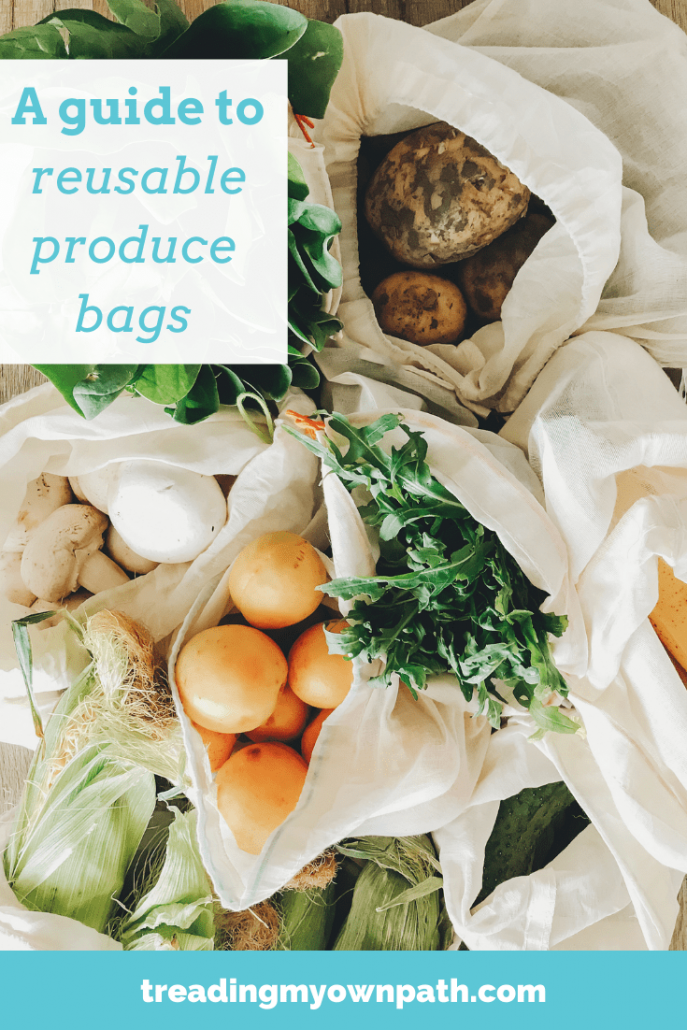
This post contains some affiliate links. You can read more about what this means at the end of the post.
Reusable produce bags – some initial things to consider
There are plenty of options with reusable produce bags. Here’s a few things to consider:
Homemade versus purchased
Homemade is always cheaper, and there’s the option to choose the exact size that you need. If you want bags that last and don’t need to be mended continually, an overlocker generally produces better (longer-lasting) results than a regular sewing machine.
The flipside of homemade is needing access to a sewing machine, and knowing how to sew.
If you do know how to sew, produce bags make great gifts.
Second-hand fabrics
Second-hand fabric is an option for making reusable produce bags, and ready-made produce bags that used second-hand fabric are also available. Fabric includes old net curtains, tablecloths, sheets and old bedding. Choose a fabric that is machine washable and can go through a hot wash (rather than the handwash cycle).
Although mosquito netting seems ideal for produce bags, most mosquito nets are impregnated with pesticides, so not desirable for use with food.
Choosing the fabric type
Different fabrics have different properties. Mesh or net bags are lightweight and see-through, but are rarely made of natural fibres. They’re also not suitable for flour and fine powders.
Cotton cloth is natural but not see-through, and is slightly heavier. (Not all stores have the ability to take off the weight of the bag on the scales, so heavy bags will cost more.) Not being transparent will slow down the checkout operators, so be mindful of using too many of these bags on a busy day.
In practice, it can be useful to have different types for different things.
Reusable produce bags – different options
Personally, I have a combination of homemade and purchased reusable produce bags, and made of different materials.
As much as I recommend making do and using what we have where possible, I also know that sometimes we need shortcuts.
If sewing if definitely not your thing (and you don’t have a relative or friend to persuade to do it for you!) then here are some ready-made solutions.
Mesh fabric produce bags
If you haven’t heard of it or used it before, Etsy is an online marketplace where people who know how to make things sell these things to those of us who do not (or do not have the time). There are plenty of sellers on the platform who make reusable produce bags out of old curtains and tablecloths (as well as sellers who use new fabric, if that’s your preference).
If the second-hand approach appeals to you but you just don’t have the time or inclination, I’d recommend looking on Etsy for reusable produce bags made of upcycled fabric.
There’s no one Etsy seller I recommend, instead I’d suggest browsing and finding the seller that is closest to your home to minimise the packaging and transport footprint.
Recycled PET Plastic Mesh Bags
Some people don’t love the idea of going plastic-free and then buying reusables made of plastic. When I first went plastic-free back in 2012 I was the same. But then I looked into it a little more and adjusted my view.
If we stopped using plastic today, and didn’t make anything else made of plastic, there is still a huge amount of plastic already in existence. Legacy plastic, I call it. From a resource perspective, it makes sense to be using this to make resources rather than leaving it somewhere to sit for all eternity.
PET is the plastic that water bottles is made from. It’s hard wearing and durable. The PET plastic bottles can be recycled into a mesh that is used to make reusable produce bags. These bags have a much lower carbon footprint than other “new” bags because they are made from 100% recycled material.
I have a set of Onya bags that I purchased for my first Plastic Free July back in 2012. They may not be as white as they were when I purchased them, but they function as good as new. (Which cannot be said for my biodegradable ones, which have, well, biodegraded and needed some stitching up).
Mesh bags are great for fruit and vegetables, loose salad leaves (the produce can be washed in the bag) and loose bread rolls.
Cotton Produce Bags
Cotton bags are great for all the things that mesh bags aren’t: powders and flours. I have a set made out of an old bed sheet. The advantage of these is that they can be repaired easily, and composted at the end of their life.
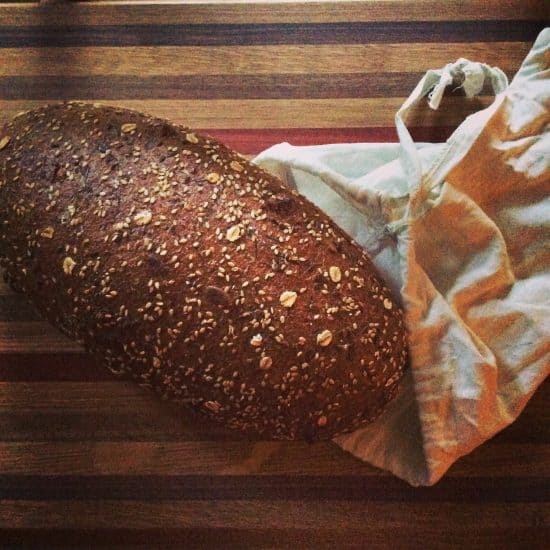
It’s possible to buy new cotton reusable produce bags: I’d recommend looking at your local bulk store as they will often stock them.
I’d always recommend supporting a local brick-and-mortar store where you can, but if this isn’t an option, they can easily be found online.
- Australia or New Zealand – I recommend Biome
- UK: I recommend &Keep
- USA: my first choie would be Life without plastic
If you’re further afield here’s a list of independent online plastic-free and zero waste stores.
Bulk reusable food bags
These reusable produce bags are a fairly new idea, and are designed for bulk store shopping (as opposed to fruit and veg shopping). Whilst reusable produce bags are very easy to transport, they aren’t ideal for storing food.
Onya Life launched these bulk bags in 2019 (made of recycled PET, which I talked about above) as a lightweight alternative to glass jars. They can be labelled and are suitable for food storage.
They are not something I’ve used, but I think they are a great alternative for those of us who don’t want to carry huge amounts of glass jars on our shopping trips, or have to decant everything into said glass jars when we get home.
Other options: making do
Before rushing out and buying anything new, have a think about what you might already have at home. Many bulk stores accept glass jars for refilling, so consider taking jars rather than bags, if that is practical. A pillowcase makes an excellent cotton bread bag. Laundry bags are a mesh alternative to mesh produce bags – and they are definitely machine washable.
If you do decide to buy something, just be sure that it is something that you will use. Reusables that sit in the back of the cupboard are not a good use of resources!
The best reusables are the ones you use often.
Now I’d love to hear from you! What reusable options do you use? Do you have one preference, or do you use a combination? If you sew, do you have fabric types you recommend and any to avoid? Are there any other alternatives or DIY hacks that you can suggest? Please share you thought in the comments below!
[leadpages_leadbox leadbox_id=140b48fc6639c5] [/leadpages_leadbox]
Disclaimer: this post contains some affiliate links which means if you click a link and choose to purchase a product, I may be compensated a small amount at no extra cost to you. I only ever recommend products I have used, companies I trust or those that are regularly recommended to me by you, my readers. Making do and buying second-hand are always my first recommendations.

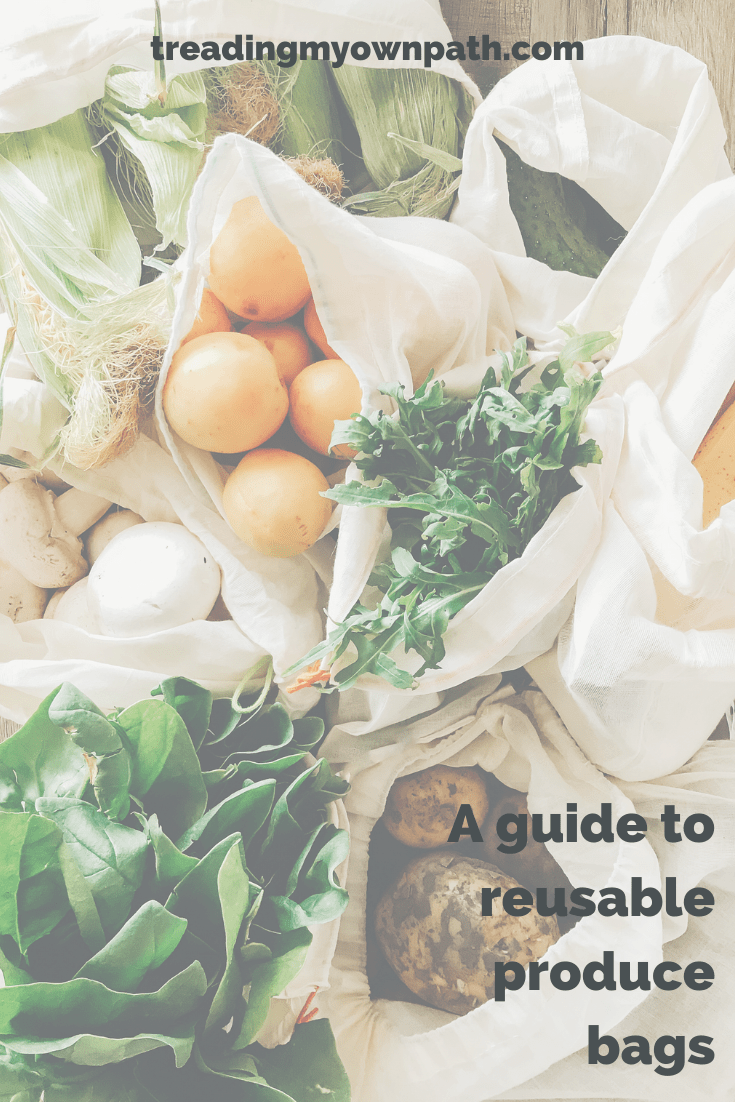
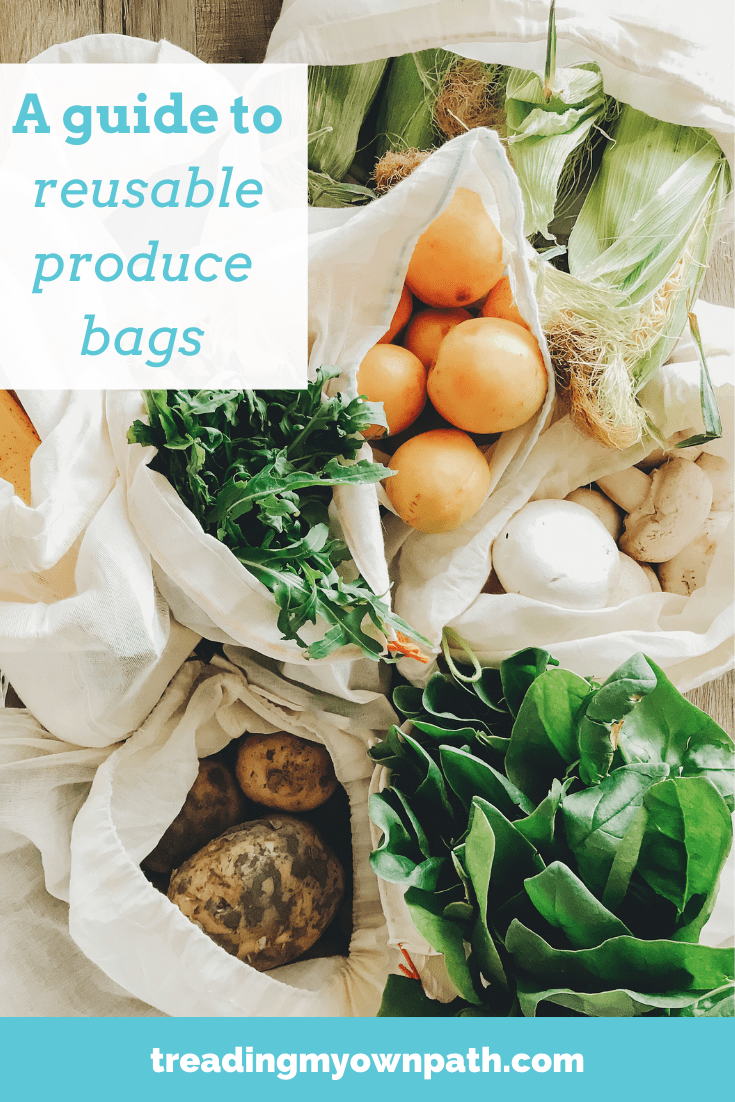
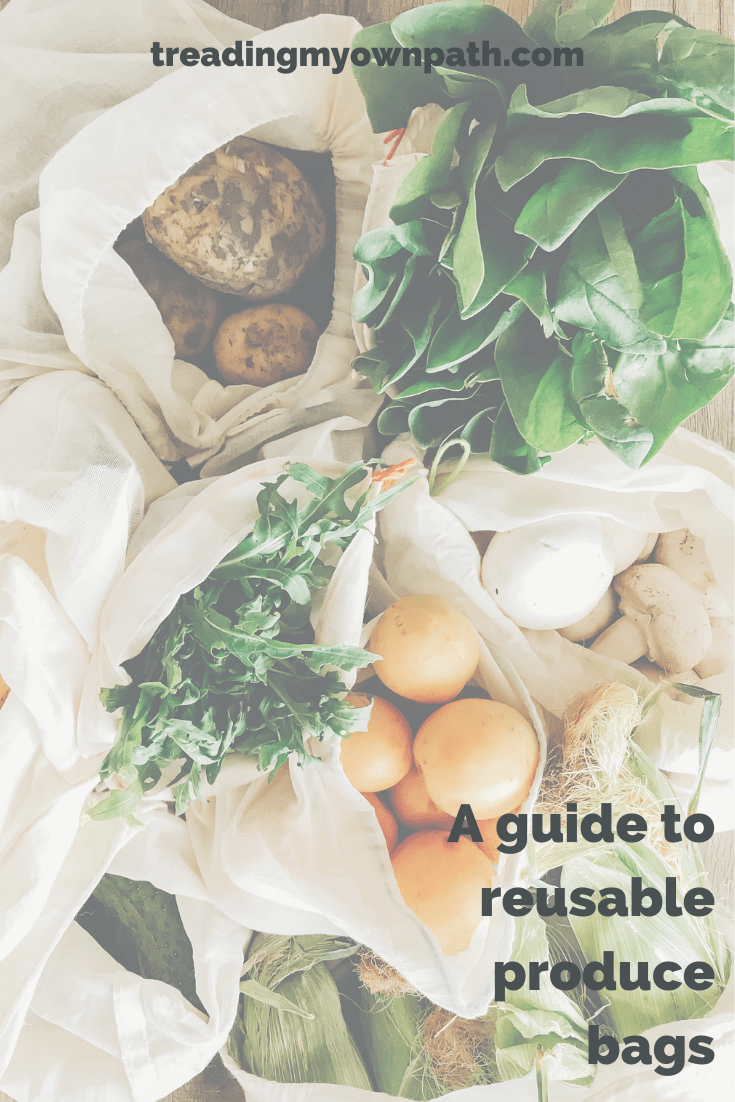
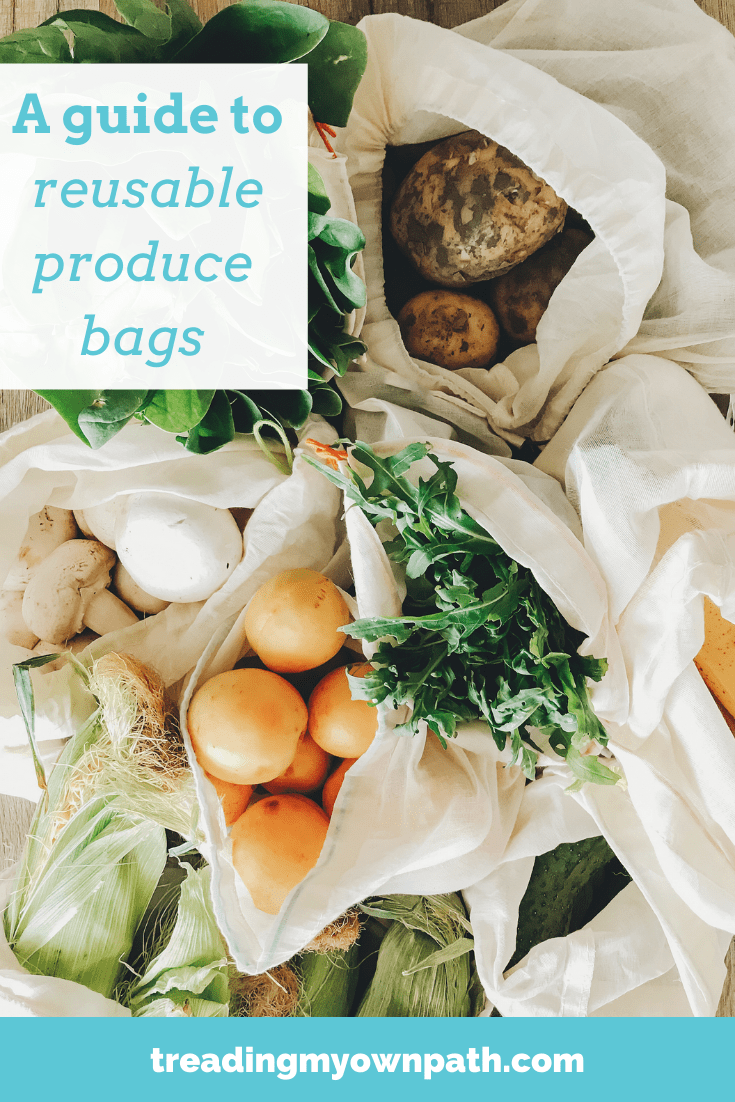

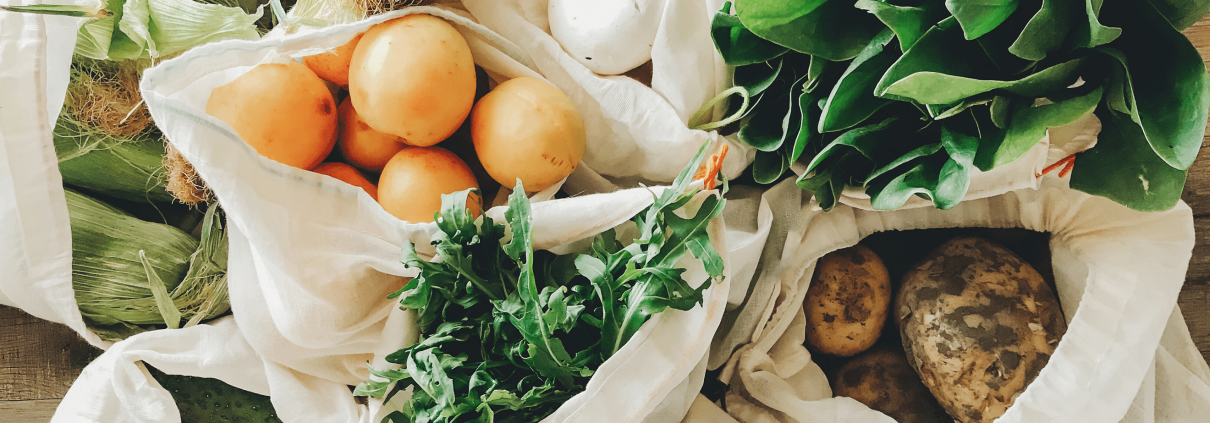
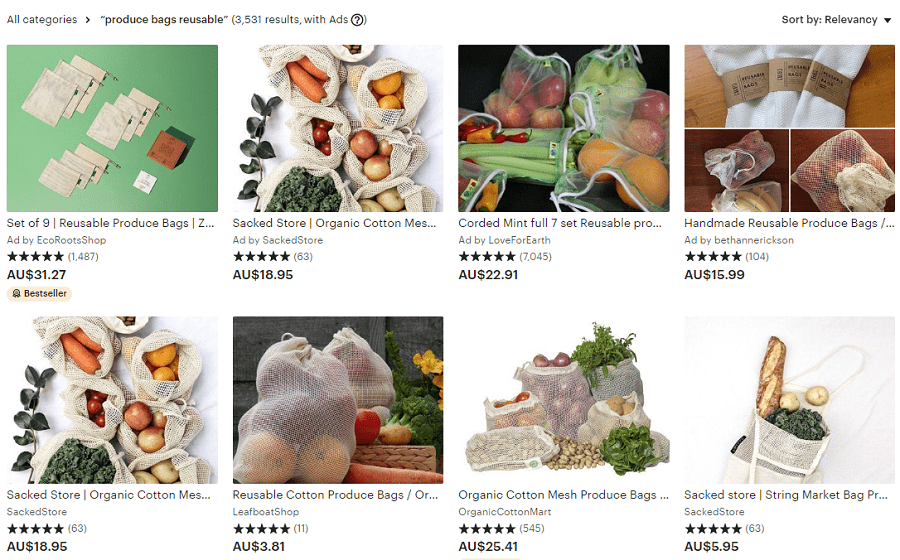
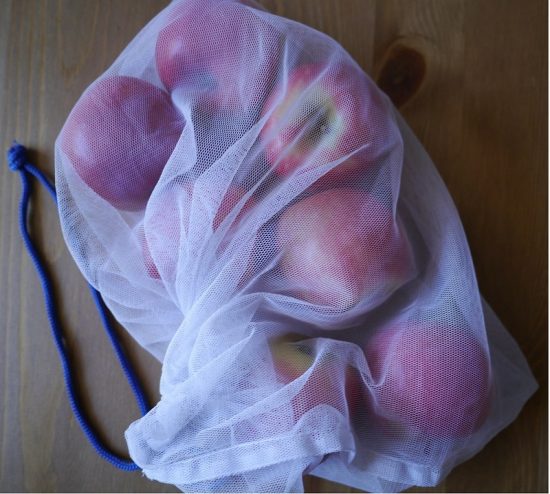
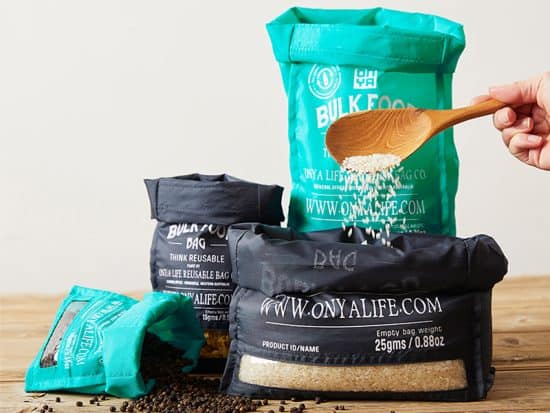




4 metres of secondhand curtain net from op shop for 50c !!; I have enough for 2 lifetimes of bags!! made them quite easily !
Wow Geraldine, that’s great! And I think you probably do – that’s a lot! ;)
Card board boxes, remember those? Great to carry things home! ;-)
Weren’t we just talking about these the other day, Helmuth?! But I’m no talking about shopping bags, I’m talking about produce bags. Sure, plenty of fruit and veg can just be purchased loose, but when it comes to bulk goods like almonds, the cardboard box isn’t so practical! Which makes me wonder actually… what do you use when you buy your bulk dry goods?!
I would use caution regarding the use of grocery boxes to bring home produce, dry goods or even using them when you move. It has been reported that SOME boxes from SOME stores can have roaches within the corrugated part of the box. You don’t want to save money if you need to spend it on the exterminator.
Don’t forget Boomerang Bags. Most groups are now sewing veggie bags from donated curtain fabrics and selling at a very good price.
Hi Judy, I definitely didn’t forget them! I’ve mentioned them in my reusable shopping bag guide here: https://treadingmyownpath.com/2018/03/29/better-reusable-bags/ None of my local groups are making the veggie bags at the moment that I’ve seen, but that is so good to hear! I’ll have to inquire if my local group is thinking about it :)
I had kept a lot of drawstring bags that came with sheets (bhumi and oh mabel), shoes and handbags. I use these as well as jars and old tins and Tupperware.
Ready made, Andrea, I love it! I have a few cotton bags that came with underwear (it is an ethical brand but I do wonder why they need to individually wrap each pair in a cotton bag, even an organic and fair trade one?) but they are a little too small for produce bags. I have repurposed them elsewhere, though! Jars and Tupperware, yep, both my favourites :)
I use old plastic bags that guests have left in the house, or that remain from past food packaging. I’ve lived plastic free for over a decade, but my friends (and to a lesser degree my husband) don’t, so I reuse the bags that randomly make their way into my home as long as possible before I send them to soft plastic recycling.
When I went plastic-free, I kept my old plastic produce bags and used them until they wore out – and a couple lasted for a year! I do love the whole “reuse” thing (you know me!), but these days I don’t really get plastic bags entering my home and if they do they go straight back out again – returned, repurposed or regifted ASAP! I’m happy to reuse paper ones, but plastic ones tend to make me stressed out, and I am better if they are gone.
I’m glad to hear your pile is done with, particularly if it was stressing you out! I’m happy that mine is smaller, and I think it will continue to go in that direction.
Don’t stress out from the plastic bags that find their way to you. Keep re-using them so at least the plastic that is more wasteful gets lots of use! Getting rid of it defeats the purpose!
We have beennwrapping vegies in paper for in the fridge and found that we get less mould or deterioration and i just buy them from local farmers shop and put them in a cotton carry bag until i get home then separate them and wrap. Yes i know its a lot of paper but at least ir is grown fior paper and rots down
Hi Mel! Thanks for sharing. If you decide down the track that you’d like to reduce your paper use, something you might want to try that worked for me is wrapping veggies (not everything, but things like lettuce) in a damp tea towel. If you give it a go, do let me know what you think!
Actually, the damp tea towel wrap is what I remember from my childhood 50 years ago. It was the way things were done then.
I have made produce bags from old cotton thin curtains( so thin they are see through). I have used my sewing machine, but also hand sewn many (have to have sething to do if watching tv!).
Also have a few orange mesh bags left over from buying mandarins last year, so reuse those for fruit and veg too. I agree you that making your own means you can make sizes to suit your needs. Have several smaller ones for the bulk shop so I don’t have to lug all my jars in.
Thank you for all your great ideas, you are an inspiration.
Thanks for sharing Sue! Curtains make great resuable produce bags, I think. Love that you have sewn your own, hurrah!
I reserve one of my reusable shopping bags for produce.
I don’t have a bulk store so I don’t need one for flour etc.
My biggest problem with plastic is packaging /containers!!!
Hi Joanna, oh I do feel a little bit sad that you don’t have access to a bulk store. They do make things easier. Still, there’s plenty of options regardless, it just takes a little more thought and planning. Oh, and time to get those habits down pat!
Flour around here comes in paper packaging so that is easy to take care of.
I’ve made them from off cuts from a local factory which makes Eco nets for researchers and schools. Most are green or black net. I wasn’t sure if people would like the dark colours but they have proved popular as they don’t stain or mark like the white ones do. I found they work for rinsing and drying the produce in. You can give things a little scrub using the bag while they are still in it. Also for straining nut milk with the fine mesh and sprouting seeds as it easy to rinse through the bag. I’m in Cornwall uk if anyone is interested I can make some more up.
Hi Anna, thanks so much for sharing! Yes, I’ve used my Onya bag as a nut milk bag. Couldn’t see the point in purchasing a bag solely for that. (Now I use cheesecloth which I prefer, but definitely still an option.) Love that you’re keen to make them for others…if only you lived a little closer to me… ;p
Anna – I am in Birmingham U.K. and could do with some help as I am really new (DAYS ONLY) to all this. Your bags sound great, where do you get the mesh from? o you make and sell or can you help me buy the mesh and tell me about sizes and how you sew them? If you could help me with buying large quantities of stuff that would be great too, found a wonderful place in London but they don’t sell online, and can’t find anything very helpful in Birmingham. Have bought some silicon covers from Amazon
to use instead of cling film or plastic and that’s about all so far.
Please help me if you can!!
Anna I would be interested in your bag making. I can make my own but some guidance to start with would be very appreciated, I live in the UK too near Cambridge. Love these initiatives!!
Our local organic honey still comes in plastic buckets. They are great for the bulk foods store – they come with a handy carry handle, and no need to decant when you get home.
Anything we can reuse is a win, Rebecca! :)
One thing I’d add – I do find that things like spinach leaves do seem to last better in the plastic bag (which I once got filled in Coles, and reuse til it falls apart). Now, admittedly, I do believe prepackaged baby spinach lasts less time that when I fill my own bag from the larger box, so there’s that. And I’m growing some. The other issue is planning – if I don’t get everything in my weekly shop and pick up on the way home, I’ve gotta remember to pack them in my work backpack.
And if you remember, last year I was eating freezer meals, so look at that for improvement!!
Hi Sarah! I find if I buy loose spinach, it will store in Tupperware or similar the best. The bagged stuff definitely does last less time – the pump CO2 into the bags so it appears to not be breaking down (ie still looks green and fresh) but once those bags are opened decay sets in pretty rapidly.
Ah yes! Look at you with all your greens! Next thing you’ll be telling me you are meal prepping green smoothies on Sundays for the week ahead! ;)
I wash my ‘single use’plastic bags because I don’t wan’t to throw them away. If a hole appears, then I fix it with sticky tape.
I try to use what I have first before buying new stuff.
You’re inspirational! I’ve joined Plastic Free July and am making good progress, but the whole world needs to take this on board. There’s only one chance. Keep inspiring people like me
Hi Lindsey, I’m an American living in Denmark. I recently started a master’s program in communications and I am researching alternatives to single-use plastics. Although Denmark has an impeccable recycling program there is still this issue of plastic packaging that seems to plague us all. It is the one type of plastic that seems to find its way to the streets and into the waters. There are many alternatives to it like plant based materials though the consensus is that it is too expensive to produce on mass levels. Petroleum based plastic is cheap yet we all know that it does not degrade. Can you share your opinion about the future of plastic packaging. Even though it is a problem, is it here to stay or will it be eventually replaced by something a little more planet friendly?
Dear Lindsay and all you thoughtful planet- saving people: Thank you so much for all your ideas and your supreme efforts to lessen the impact of plastic waste. Although I am too far away from a bulk store as I live out in the countryside here in Germany, I do my very best to try to abstain from plastic and reuse as much as I can (and purposely buying milk in glass bottles that can be rinsed out and returned). What I have problems with and maybe you can suggest alternatives — “q tips” for ear cleaning, and those dreadful small bits of plastic parts put on small brushes for cleaning between teeth (even when you buy a holder where you can change the brushes when they wear out, which is frequent), for instance, Curaprox from a Swiss manufacturer).
I will be revealing my high age now but have to tell you that when I was a teenager, we were able to buy lipsticks and compacts that were not thrown away. I would go to store and just have salesperson replace my lipstick in its same container (she took out with a sort of small device that removed it from the metal tube) in a second. And the same thing for replacing a new portion of face powder in a compact. Imagine how much we would save by being able to do this all over the world NOW! Of course, it also reveals a time when one was satisfied with a simpler lifestyle, without thinking one “needed” 10 different lip colors (I didn’t then, and do not now).
Blessings to all of you, and Lindsay, for having started this site, which I “fell” into last year.
Thanks,
Jean Kroeber from Odenwald, Germany
I have bird netting to protect my berry plants.
It never comes off as nicely as it went on
It’s plastic, i think but should make good reusable produce bags, I hope. Going to give it a try.
Double sided bags are easy to make for flour and dont leak made from calico
Double sided is a great idea, Mel!
Can you tell me exactly what is double sided bags. I dont really know what you are talking about. For powder goods as flour, sugar, spices, etc I made mine out of nylon. I found a very thin yet strong white nylon dust cover or garment bags (usually for men suits). I also bought a bright yellow nylon rain cape. Both from a thrift store. Lots of fabric in these items for 1$ each.
I am looking at using nylon for fine, powdered bulk foods. I’m concerned that the stitches will allow flour/sugar/etc. to leak out. Is there a particular stitch you recommend, Andrea?
I’m keen to make my own produce bags etc….but having trouble finding out how sensitive supermarket scales may be?? Is there a certain number of grams that the scales allow for? I have made a bag out of an old sheer curtain and it is a bit heavier than the one I bought to use as a comparison. Does anyone have any idea about this?
Hi Lian, great question. The scales are usually set up to tare the weight of a plastic bag (or maybe a paper bag for mushrooms and potatoes). So that’s between 3 -7 g. A reusable produce bag will be heavier than that, so you are potentially paying for the bag, but we are talking about 10g over the entire item. So 2kg of apples at 2.99/kilo would mean you pay 3 pence/cents extra for using your own bag. For me, I think it is worth it. The only time it really is an issue is if you’re buying something very high price per kilo (say tea, which might be $100/kilo as it is super light) and you only buy 50g. For items like this I use jars, and ensure they are tared before filling. Hope that makes sense!
I am selling produce bags polyester and organic cotton at a cheaper wholesale rate..it costs lesser than the one you stich at home..no hassle ..shoot me an email at jillbyeco@gmail.com
Hi, loved your article. I purchased a bunch of mesh laundry bags at the dollar store. Cheap! I also have drawstring bags I made from pillow cases I got at a rummage sale.
Trying my best to cut down on plastic. I use Mason jars for leftovers and storage.
The best thing of this bags are their availability in various sizes, at reasonable rate and eco friendly as they are reusable.
Dollar store sheer curtains that I sewed into produce bags. They’re great at the grocery store but I’m not impressed with how food holds up in them in the fridge. Haven’t got the whole thing worked out yet.
Not a comment but a question…it seems to me that greens would wilt more even in the fridge if exposed to air via a mesh bag….but that must be wrong?? thanks…martha t
Hi Martha! Yes they would – so either wrap them in a damp tea towel, or place in a lidded container (I like to use a glass Pyrex). They’ll keep better than they ever did in plastic like this.
Hi there
I’m wondering if you have come across any reusable produce bags which can be recycled after their “life” is over?
I’d like to purchase some but I’d like to not purchase another product I will eventually have to send to landfill.
Tks so much.
Cheers
Amanda.
Hello! I make reusable bags from plastic bags that have ended their “life” as well as from plastic packaging, inserts, etc. Send me an email and I can send you more info!
Kimberley
KimberleyCormier1@gmail.com
Hi! Thanks for this information! I use muslin reusable produce bags. They really keep my fruit and vegetables fresh. They are also suitable for flour and sugar.
Hi really good information about reusable produce bags.
Nylon curtains (very cheap) cut up and sewed into simple drawstring bags. They’re lightweight, sheer, and simple to make and use.
Good tip, Carla :)
This is very perfect blog.
I’m getting ready to get some reusable produce bags but when I googled it there were so many brands(offers) I became overwhelmed. Extremes in prices, etc. please help me. No info on making my own please as this is not an option at the moment. Also since I am trying to remove plastic from my life what can you suggest. For “poo poo pick up”.
Thank you
Lisafb176@ymail. Com
Hi Lisa. Have a look at some of the links I’ve provided here. Either Etsy if you’d like handmade, or Onya Life if you’d like something well made and reliable.
It is a nice blog, I agree with you many benefits of using cotton bags, face mask, jute bags, hand glove and also helpful for nature. It is a good blog us.
It is a nice blog, I agree with you many benefits of using cotton bags and also helpful for nature. It is a good blog us For more details to Vist Your site Face mask Cotton bags T-shirts Jute bags Hand Glove
It’s very nice content. I have got many benefit from your content. Now I have known the use of cotton bags and its benefit. Thanks and a good job.